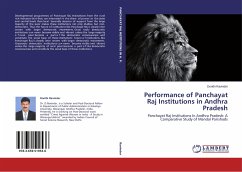Developmental programmes of Panchayat Raj Instituttions from the rural rich indicates that they are interested in the share of power at the state and central levels than local. Secondly absence of support from the large majority of the poor makes these institutions not only shallow but non-democratic. Thus the future of institutions like Panchayat Raj is closely inter woven with larger democratic movements. Grass roots democratic institutions can never become visible and vibrant unless the large majority of rural poor become a part of the democratic consciousness and constitute the social base of these institutions future of institutions like Panchayati Raj is closely inter woven with larger democratic movements. Grassroots democratic institutions can never become visible and vibrant unless the large majority of rural poor become a part of the democratic consciousness and constitute the social base of these institutions.
Bitte wählen Sie Ihr Anliegen aus.
Rechnungen
Retourenschein anfordern
Bestellstatus
Storno








